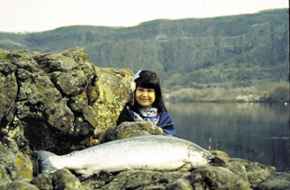forum
library
tutorial
contact

Dam Breaching a Political Hot Potato
by Cate MontanaIndian Country - August 23, 2000
|
the film forum library tutorial contact |

|
Dam Breaching a Political Hot Potatoby Cate MontanaIndian Country - August 23, 2000 |
 KENNEWICK, Wash. - To fence-sit or not to fence-sit. That is the question Democratic
presidential candidate Al Gore is facing in Washington, Oregon and Idaho.
KENNEWICK, Wash. - To fence-sit or not to fence-sit. That is the question Democratic
presidential candidate Al Gore is facing in Washington, Oregon and Idaho.
Dam breaching, the Number One, get-my-vote ticket item for tribes and many conservationists, is at the top of the no-no list for the majority of voters in eastern Washington and Oregon and western Idaho who traditionally vote a straight Republican ticket.
Dam breaching would affect local economies, power production by the Bonneville Power Administration for the Northwest and the transportation of millions of tons of agricultural and industrial products barged every year on the Columbia and Snake River systems as far east as Lewiston, Idaho.
With so much at stake and emotions riding high, so far Gore is choosing the fence. By supporting the Clinton administration's "Draft Basin-Wide Salmon Recovery Strategy" released last month, he can safely take a wait and see stance: wait until after the elections and see what the final strategy should be.
But siding with the draft strategy doesn't sit well with the tribes, a fact that Antone Minthorne, chairman of the Confederated Tribes of the Umatilla Reservation, said he was going to point out at last week's Democratic National Convention in Los Angeles. As a Democratic delegate, Minthorne said he intended to bring the dam breaching issue up to Gore's Indian liaison while he was in Los Angeles.
Not that the tribes are considering defecting from the Democratic camp. Far from it, but fence-sitting is hardly impressive. All of Gore's efforts to garner more of a political following in the region by not openly advocating dam breaching is, most likely, for naught.
Some voters in the conservative, agri-industrial Columbia River Basin think that if Al Gore suddenly came out vehemently opposed to dam removal now and forever, that he still wouldn't get a single additional vote.
"Those people are very much on the 'private property rights, anti-government' bandwagon," says Scott Bosse, a biologist with the conservation group Idaho Rivers United. "I think with a close presidential race in Washington and Oregon, Vice President Gore is being counseled by people like Rep. Norm Dicks and Gary Locke and Patti Murray of Washington, not to touch this issue before the election.
"I don't think they want to carry the baggage of having to deal with the vice president or an administration that supports dam removal when they, in fact, don't support it."
Hot potato issues have a history of being ignored in close elections. But while caution keeps some votes, it loses others. Recent polls indicate Green Party presidential candidate Ralph Nader is gathering 7 percent of Oregon voters and perhaps as much as 12 percent of Washington state.
Gore's supporters rightfully worry that many environmentalists, who would normally back Gore, are switching to a candidate who will at least take a firm stance.
And although it is most unlikely Nader will have a chance in the presidential race, he definitely will impact the race by losing the Democrats' votes. And, Gore losing votes is the last thing the tribes want to see.
Charles Hudson, public information manager of the Columbia River Intertribal Fish Commission points out that the next president will probably seat three new Supreme Court justices. If the tribes end up going into a landmark treaty case over the Snake River salmon and the issue of dam breaching, litigation is likely to last for years, if not decades. New Supreme Court appointees will affect numerous laws affecting tribes for decades to come.
"It's something we don't take very lightly," Hudson says.
While Gore takes the middle road and the heat from disappointed tribes and environmentalists, supporters of Republican presidential candidate George W. Bush and Washington's Republican incumbent Sen. Slade Gorton, continue to enjoy their candidate's firm stand on the anti-dam breaching approach to salmon recovery.
"Washington state and the Pacific Northwest region is united in its support to work together on salmon recovery," Gorton said. "But let's leave the dams right where they are and work on locally-driven solutions. ...We will save our salmon runs without destroying our dams."
In July, the Senate passed the Interior appropriations bill for fiscal year 2001 which includes Gorton's requests for Washington state's salmon recovery efforts and recreational areas. Gorton, chairman of that committee, secured more than $60 million for Washington state, nearly $12 million of which is aimed toward salmon recovery programs such as Regional Fisheries Enhancement Groups, the Washington State Salmon Recovery Fund and the Western Washington Hatchery Reform Initiative.
While such programs certainly help, they are the barest fraction of what is needed for a full-fledged salmon recovery effort. If Democratic candidates don't show a bit more spunk in the environmental arena, tribes and the environmental groups say they are afraid they're going to be left with exactly such locally administered programs and a deeply disappointing federal salmon recovery strategy.
learn more on topics covered in the film
see the video
read the script
learn the songs
discussion forum
